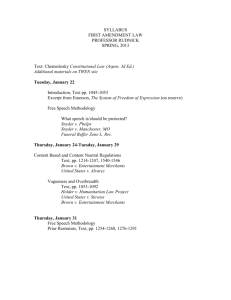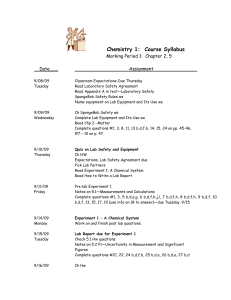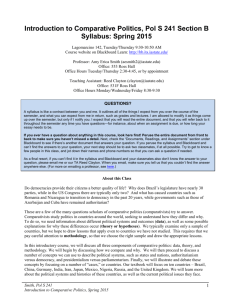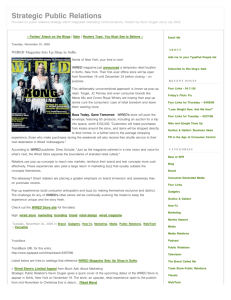Patrick Windham
advertisement
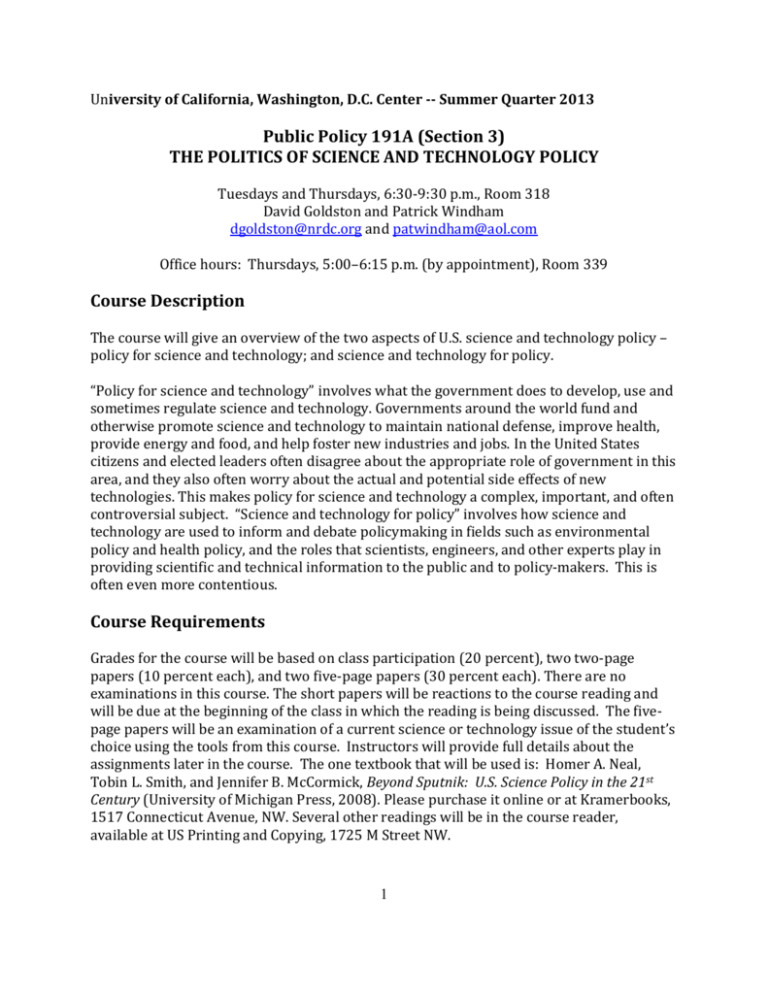
University of California, Washington, D.C. Center -- Summer Quarter 2013 Public Policy 191A (Section 3) THE POLITICS OF SCIENCE AND TECHNOLOGY POLICY Tuesdays and Thursdays, 6:30-9:30 p.m., Room 318 David Goldston and Patrick Windham dgoldston@nrdc.org and patwindham@aol.com Office hours: Thursdays, 5:00–6:15 p.m. (by appointment), Room 339 Course Description The course will give an overview of the two aspects of U.S. science and technology policy – policy for science and technology; and science and technology for policy. “Policy for science and technology” involves what the government does to develop, use and sometimes regulate science and technology. Governments around the world fund and otherwise promote science and technology to maintain national defense, improve health, provide energy and food, and help foster new industries and jobs. In the United States citizens and elected leaders often disagree about the appropriate role of government in this area, and they also often worry about the actual and potential side effects of new technologies. This makes policy for science and technology a complex, important, and often controversial subject. “Science and technology for policy” involves how science and technology are used to inform and debate policymaking in fields such as environmental policy and health policy, and the roles that scientists, engineers, and other experts play in providing scientific and technical information to the public and to policy-makers. This is often even more contentious. Course Requirements Grades for the course will be based on class participation (20 percent), two two-page papers (10 percent each), and two five-page papers (30 percent each). There are no examinations in this course. The short papers will be reactions to the course reading and will be due at the beginning of the class in which the reading is being discussed. The fivepage papers will be an examination of a current science or technology issue of the student’s choice using the tools from this course. Instructors will provide full details about the assignments later in the course. The one textbook that will be used is: Homer A. Neal, Tobin L. Smith, and Jennifer B. McCormick, Beyond Sputnik: U.S. Science Policy in the 21st Century (University of Michigan Press, 2008). Please purchase it online or at Kramerbooks, 1517 Connecticut Avenue, NW. Several other readings will be in the course reader, available at US Printing and Copying, 1725 M Street NW. 1 Course Outline and Assigned Readings Tuesday, June 25 – Introduction to the Politics of Science and Technology Policy Readings will be handed out and discussed in class. President Dwight D. Eisenhower’s Farewell Address (Jan. 17, 1961) Drafts of the “High Quality Research Act” (2013) Thursday, June 27 – Science and Technology in American Political History Leo Marx, “Does Improved Technology Mean Progress?” in Albert Teich, Technology and the Future. Vannevar Bush, Science – The Endless Frontier (main report, not appendices) http://ia600408.us.archive.org/18/items/scienceendlessfr00unit/scienceendlessfr00unit.pdf National Science Foundation Act of 1950 Tuesday, July 2 – Issues in Technology Policy Neal, Smith, and McCormick, Beyond Sputnik, Chapters 1 and 2 Dorothy Nelkin, “Science, Technology, and Political Conflict: Analyzing the Issues,” in Dorothy Nelkin, editor, Controversy: Politics of Technical Decisions Bill Joy, “Why the Future Does Not Need Us, Wired, April 2000 http://www.wired.com/wired/archive/8.04/joy_pr.html Thursday, July 4 – NO CLASS Tuesday, July 9 – The Roles of the Scientist in Policy Henrik Ibsen, An Enemy of the People, http://www2.hn.psu.edu/faculty/jmanis/h-ibsen/enemypeople.pdf Thursday, July 11 (7:15 p.m.) – Science for Policy Case Study: Clean Air Regulations U..S. House of Representatives, Committee on Science, The Science Behind the Environmental Protection Agency’s Proposed Revisions to the National Ambient Air Quality Standard for Ozone and Particulate Matter, Part I, pp. 1 -121 Tuesday, July 16 – Making Science and Technology Policy: Main Institutions and Players Patrick Windham, “Instructor’s Note: The Organization of Executive Branch and Congressional S&T Activities” Neal, Smith, and McCormick, Beyond Sputnik, Chapters 3, 4, and 5 Thursday, July 18 – R&D Funders and Performers Roger G. Noll and Linda R. Cohen, “Economics, Politics, and Government Research and Development,” Chapter 6 in Kraft and Vig, editors, Technology and Politics Neal, Smith, and McCormick, Beyond Sputnik, Chapters 6, 7, and 8 2 Tuesday, July 23 – S&T Policies for Energy and for Industrial Competitiveness Vicki Norberg-Bohm, “Creating Incentives for Environmentally Enhancing Technological Change: Lessons From 30 Years of U.S. Energy Policy,” Technological Forecasting and Social Change, volume 65, October 2000 National Research Council, Rising Above the Gathering Storm (Executive Summary) http://www.nap.edu/catalog.php?record_id=11463 Robert Atkinson, “Deep Competitiveness,” Issues in Science and Technology, Winter 2007, http://www.issues.org/23.2/atkinson.html Thursday, July 25 – Science for Policy Case Study: Climate Change U.S. House of Representatives, Committee on Energy and Commerce, Questions Surrounding the ‘Hockey Stick’ Temperature Studies: Implications for Climate Change Assessments, pp. 1 – 124 National Academy of Sciences, Surface Temperature Reconstruction for the Last 2,000 Years (2006), “Summary.” Available at: http://www.nap.edu/catalog.php?record_id=11676 Tuesday, July 30 – Evolution Memorandum of Decision by Judge Jones in Kitzmiller v. Dover Area School District, www.pamd.uscourts.gov/kitzmiller/kitzmiller_342.pdf or www.bu.edu/lawlibrary/PDFs/research/portals/probonofiles/kitzmiller.pdf 3




